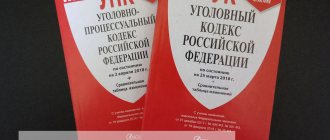New edition of Art. 112 of the Criminal Code of the Russian Federation
1. Intentional infliction of moderate harm to health, not dangerous to human life and not entailing the consequences specified in Article 111 of this Code, but causing long-term health disorder or significant permanent loss of general working capacity of less than one third, -
shall be punishable by restriction of freedom for a term of up to three years, or forced labor for a term of up to three years, or arrest for a term of up to six months, or imprisonment for a term of up to three years.
2. The same act committed:
a) in relation to two or more persons;
b) in relation to a person or his relatives in connection with the performance of official activities by this person or the performance of public duty;
c) in relation to a minor or another person who is known to be in a helpless state by the perpetrator, as well as with special cruelty, humiliation or torture for the victim;
d) by a group of persons, a group of persons by prior conspiracy or an organized group;
e) for hooligan reasons;
f) for reasons of political, ideological, racial, national or religious hatred or enmity, or for reasons of hatred or enmity towards any social group;
g) no longer valid
h) with the use of weapons or objects used as weapons -
is punishable by imprisonment for a term of up to five years.
What health hazards are classified as moderate?
Regardless of the reasons why harm to a person’s health occurred (beating, poisoning, accident, work injury, etc.), the degree of its severity is determined taking into account the Medical criteria approved by Order of the Ministry of Health of April 24, 2008 No. 194n.
Harm to health will be a violation of the anatomical integrity and physiological functions of organs or tissues of the human body by any external influences.
Depending on the signs, which are called qualifying, only 3 degrees of severity of harm to health are determined:
- Slight harm to health.
- Moderate harm to health.
- Serious harm to health.
Moderate harm to human health meets the following criteria:
- It does not pose a threat to the victim's life.
- Did not cause loss of speech, hearing, vision, organ, inability to function, mental illness, termination of pregnancy, drug addiction/substance abuse, permanent facial disfigurement, loss of ability to work more than a third or the full extent of professional ability. These consequences are not life-threatening, but by their nature they significantly affect the quality of future life.
- Causes health problems and incapacity for work lasting 21 days or more. In this case, it is calculated in days during which the restriction took place and did not undergo treatment, since sometimes these periods do not coincide. That is, for this characteristic, specific injuries and damages are not defined; only the condition for classifying them as moderate severity is indicated - the duration of temporary disability is more than 3 weeks.
- Caused the loss of 10-30% of total working capacity. It consists in the loss of functions (for example, caring for oneself), loss of skills, and the ability to carry out work. The percentage of such loss is determined in accordance with the table - Appendix to the above-mentioned order.
Injuries causing moderate harm
Any injuries and damages that meet the above requirements can result in moderate harm. This takes into account not only the injuries themselves, but also their consequences, which may vary depending on the specific person who received them, his state of health, age and many other factors.
Often in practice (from verdicts) experts regard the following as having caused moderate harm to health:
- closed simple fractures of bones without displacement (nose, jaw, cheekbone, ribs, arm bones, legs and others);
- cracked ribs;
- dislocations;
- closed head injuries without serious consequences;
- injuries resulting in a narrowing of the field of vision, a decrease in its acuity, decreased hearing or deafness in one ear;
- loss of 4 or more teeth, one finger or part thereof;
- various soft tissue wounds and many others.
What is moderate battery?
Moderate battery is a crime against the person, which, through the use of brute directed force on the body of the victim, caused him significant harm. The harm caused is qualified by a number of signs.
The crime is defined as the intentional beating of a person or the infliction of numerous blows on him, which led to health problems and temporary loss of ability to work.
The category of moderate injuries received includes the following:
- concussions;
- traumatic brain injuries;
- bone fractures;
- hematomas, etc.
In this case, the victim loses the ability to participate in socially useful activities and suffers moral and material damage.
According to the qualification criteria, the victim’s health is impaired by approximately “one third.”
The motives for beatings can be any intentional or unintentional actions. Often these are street fights among young people.
Family proceedings with assault, when an angry husband delivers uncontrollable, crushing blows to the head or stomach of the victim, twists or twists her arms, which leads to fractures and other serious consequences.
For example, a patient admitted to the hospital with nausea and dizziness was examined.
It was discovered that she had a concussion as a result of a head injury. The circumstances of the investigation revealed that the beating was committed by her husband, who was arrested for 5 years.
In a street fight, after being punched, a teenager received a large hematoma in the eye area; the blow temporarily caused hearing loss. The minor opponent was registered in the police nursery; no more severe punishment followed.
A resident of one of the villages, motivated by jealousy, lay in wait near his rival’s house and suddenly dealt him a crushing blow to the head.
After the fall, he continued to kick him. As a result of multiple fractures, the injuries inflicted were classified as moderate severity, which resulted in imprisonment for three years.
Who determines harm to health
The severity of the injuries received by the victim is determined exclusively by forensic medical examination.
The expert conducting the examination (doctor) to determine the severity of harm to health can be either an employee of a medical institution or an individual entrepreneur. The requirements for him are the presence of special knowledge, a license for medical activities, including for conducting examinations.
The same criteria and rules apply for conducting expert research, regardless of the purpose of their conduct and further use. Expert conclusions can be used in civil (in claims for damages), administrative (in cases of offenses) and criminal (in criminal cases) proceedings.
Various objects can be studied during the examination:
- the victim himself;
- materials of the case for which the examination was initiated;
- original medical documents with comprehensive information about injuries and their clinical course;
- If necessary, other documents and information are studied.
The General Rules by which such studies are carried out are approved by the Government of the Russian Federation (Resolution No. 522 of August 17, 2007).
How to hold people accountable?
As we described above, criminal liability threatens in all cases (intentional infliction of injury, infliction of moderate harm in a state of passion, injury by exceeding measures during detention), except for injuries of moderate severity received due to negligence.
- Visit the police station to file a criminal complaint. It should contain:
- Full name, residential address, contact number, signature, date.
- Information about the crime committed: time and place where it happened, the number of criminals, their actions, etc.
- The purpose of the statement is to bring the perpetrator to criminal liability.
- After submitting the application, an inspection will begin, a forensic medical examination will be carried out to determine the presence of harm to health and the severity.
As a result, when the case materials are processed, the investigator will issue a verdict to initiate a criminal case : a positive answer or a refusal.
Criminal liability for moderate harm to health
The Criminal Code of Russia has several norms in which the consequences in the form of harm to the victim’s health, qualified as moderate severity, are directly named as a mandatory feature for bringing to responsibility. This is Art. 112, 113 and 114.
Art. 112 of the Criminal Code of the Russian Federation
This provision provides for punishment for intentional actions and inactions that caused moderate harm to the health of the victim of a crime.
Details: Art. 112 of the Criminal Code of the Russian Federation. Intentional infliction of moderate harm to health
This can be such active actions as beating with hands, feet, objects, causing injuries, wounds, cuts, burns, sections, poisoning, as well as creating conditions in which the victim will inevitably receive damage, etc.
Considering that the ability to realize the value and inviolability of another person’s health should be formed at an early age, the legislator established liability for this crime from the age of 14.
The maximum punishment under Art. 112 is provided for causing damage with qualifying criteria (when there are 2 or more victims, committed by a group of people, for hooligan reasons, etc. (Part 2)) - up to 5 years of complete isolation from society in prison. If these signs are not present in the act (Part 1), the most severe punishment is 3 years in prison.
Investigation of criminal cases under Art. 112 of the Criminal Code of the Russian Federation is being investigated by investigators from the Ministry of Internal Affairs.
Art. 113 of the Criminal Code of the Russian Federation
Under this article, causing moderate harm to health is punishable if the perpetrator was in a special mental state at the time of the commission, called a state of passion .
Affect is a sudden strong emotional disturbance, as a result of which a person momentarily loses control over his actions and cannot direct them.
In Art. 113 provides an exhaustive list of the reasons why this condition is caused. These reasons relate to the behavior of the victim and provoke the perpetrator to a kind of protection from the negative actions of the victim. The cause of passion for the onset of liability under Art. 113 may include the following actions:
- Violence on the part of the victim towards the perpetrator - beatings, beatings, wounds, sections, injections, burns, mental violence, etc.
- Bullying - physical or mental. These are violent or insulting actions against the perpetrator, characterized by cynicism.
- A grave insult is a cruel, gross humiliation of the dignity of the perpetrator by word, action, etc.
- Other unlawful or contrary to morality, immoral behavior of the victim.
- A psychotraumatic situation that lasts for a significant period of time, resulting from such behavior of the victim. It can develop due to long-term, systematically occurring quarrels, conflicts, bullying and violence against the perpetrator.
The punishment for this crime compared to the sanction of Art. 112 of the Criminal Code of the Russian Federation is a little softer, the most severe is up to 2 years in prison. Prosecution is possible from the age of 16.
Within the same limits, similar actions are punishable, but with consequences for the victim in the form of serious harm to his health.
Criminal cases are investigated under Art. 113 of the Criminal Code of the Russian Federation, investigators of the Ministry of Internal Affairs.
Art. 114 of the Criminal Code of the Russian Federation
This article consists of 2 parts, each of which punishes the infliction of moderate harm to the health of the victim, committed in special conditions that also deserve mitigation of punishment:
- When the limits of necessary defense are exceeded (part 1). The limits of such protection are described in Art. 37 of the Criminal Code of the Russian Federation. The basis for recognizing it as adequate to the actions of the attacker is the reality of the possibility of causing harm dangerous to the health and life of any person, not only the one defending himself. The most severe punishment for causing moderate harm to the health of a person from whom the perpetrator was defending himself is up to a year in prison.
- If the measures necessary to apprehend a criminal are exceeded (part 2). It is understood as their obvious discrepancy between the danger of the detained person and the crime committed by him, when, based on the circumstances, clearly excessive harm is caused to him (Article 38 of the Criminal Code of the Russian Federation). The most severe punishment is up to 2 years in prison.
The same article punishes actions that cause grievous harm. Responsibility begins at age 16. Investigators from the Ministry of Internal Affairs are also investigating the cases.
Average harm to health in other articles of the Criminal Code
In some norms of the Criminal Code, harm to the health of the victim of moderate severity is indicated as a necessary consequence of illegal actions on the part of the perpetrator for liability to occur.
However, there are other articles where such consequences are not mandatory, but are a sign of toughening the punishment. Based on the definition of average severity of harm to health, it is included in the qualifying feature “with the use of violence that is not dangerous to life and health” or “with the use of violence” (any, including causing harm to health of moderate severity).
Among the most common is, for example, robbery under paragraph “g” of Part 2 of Art. 161, theft under paragraph “c” of Part 2 of Art. 166, extortion under paragraph “c” of Part 2 of Art. 163 of the Criminal Code of the Russian Federation.
Careless infliction of average bodily harm
There is no provision for criminal liability for actions or inactions that cause harm to another person, which is regarded as moderate, committed through negligence.
Previously, before the adoption of Federal Law No. 162-FZ of December 8, 2003, such actions were punishable under Art. 118 of the Criminal Code of the Russian Federation. This law introduced changes to the article, in connection with which liability for careless infliction of harm of moderate severity was excluded. Currently, only careless infliction of grievous bodily harm is prosecuted under this article.
Similarly, there is no criminal liability for moderate harm caused to the health of the victim as a result of an accident. It can only occur if the incident has consequences for the victim in the form of serious harm to his health (Part 1 of Article 264 of the Criminal Code of the Russian Federation).
Liability for average damage as a result of an accident
The absence of criminal liability for causing moderate harm to the health of a victim in an accident due to the violation of the Traffic Rules by the perpetrator does not mean that such an act is not prosecuted at all; it is punishable under Part 2 of Art. 12.24 Code of Administrative Offenses of the Russian Federation.
The process of conducting an investigation into such facts, bringing them to justice, and considering cases is significantly different from the criminal process. The punishment for such an offense may be a fine of 10 thousand to 25 thousand rubles, the alternative is deprivation of a driver’s license for a period of 1.5 to 2 years.
Compensation for moderate health damage
The manner and process for adjudicating personal injury claims differs significantly between criminal and civil proceedings. What is common is that in such cases two types of damage can be compensated – property and moral.
Material damage
Material, or property, damage may consist of:
- earnings that the victim received less due to incapacity for work;
- expenses for treatment, additional food, care, medicines, rehabilitation means, a sanatorium, if the victim needs them, they were paid for and were not provided free of charge.
This type of harm is compensated based on the data from the relevant medical and payment documents.
Moral injury
The rights to personal integrity and health are classified by law as personal non-property rights, and therefore their violation provides the victim with the right to compensation for moral damage caused by damage to health.
Moral damage is suffering caused by pain, the consequences of injuries, wounds, other damage, and their impact on the life of the victim and the life of his family.
The decision on the amount of material compensation according to the rules of Art. 151 of the Civil Code of the Russian Federation is decided by the court, based on the facts found out at the court hearing - the degree of guilt of the criminal, his lifestyle, the suffering of the victim, taking into account his individual characteristics, and others.
There is no specific amount or limit established by law. The victim determines it himself, but the decision on the final amount is made by the court based on the results of an examination of relevant circumstances and documents.
The procedure for recovery in criminal proceedings
The process of compensation for harm caused is the same for all criminal cases, including those involving damage to the victim that resulted in moderate harm to his health. The only difference is the possibility of compensation for moral damage, which may not be available in other cases.
Article 44 of the Code of Criminal Procedure of the Russian Federation directly states that a person who has suffered from a crime has the right to file a civil claim for compensation for material damage and compensation in property or monetary terms for the suffering suffered (moral damage). This also applies to all cases of causing moderate harm to the victim’s health.
Filing claims for damages
A civil claim in a criminal proceeding may be filed from the moment the case is initiated until the end of the judicial investigation stage. There are no strict requirements for its form or content, as when filing a claim in civil proceedings.
It is addressed to the investigator, inquiry officer, or court, and must contain a request for recognition as a civil plaintiff. recognize him as a civil plaintiff (recognition is formalized by a resolution). Together with the confession, the victim acquires all his rights and obligations (Part 4 of Article 44 of the Code of Criminal Procedure of the Russian Federation).
You can abandon the claim until the moment when the court retires to the deliberation room to make a final decision on the case.
The undoubted advantages in this case are:
- There is no obligation to pay the state fee for the statement of claim (Part 2 of Article 44 of the Code of Criminal Procedure of the Russian Federation).
- Absence of complex requirements for the form and content of the claim, its justification.
- The responsibility to establish the nature and extent of the harm caused by the crime (Article 73 of the Code of Criminal Procedure of the Russian Federation) lies with the person who is investigating the criminal case (investigator/inquirer). This does not deprive the victim of the right to present evidence to substantiate the extent of the harm.
- Simultaneous consideration of the claim and the criminal case itself, or a separate statement of claim in civil proceedings, is not necessary.
Possible court decisions on the claim
Based on the results of consideration of the claim, the court may make one of the following decisions:
- Satisfy it partially or fully (if the right to compensation and its amount are proven and justified).
- Refuse satisfaction (for example, if the damage is not subject to compensation, or if the person is acquitted);
- Recognize the plaintiff's right to satisfy the claim, while transferring consideration of the amount of compensation through civil proceedings. In this case, you will have to file a claim according to the requirements of civil law.
Amount of compensation for damage
The amounts that can be recovered from the perpetrator of causing moderate bodily injury in favor of the victim are completely different . The courts rely on practice, including that developed in the region. Moral damage, for example, can reach 500 thousand rubles. And, of course, intentional harm caused as a result of a crime under Art. 112, should be assessed higher than under Art. 113 and 114 of the Criminal Code of the Russian Federation.
The nature and extent of the harm must be established during the proceedings (clause 4, part 1, article 73 of the Code of Criminal Procedure of the Russian Federation). The amount of damage, both property and moral, must be confirmed by relevant documents, checks, witness statements, etc. Property damage is compensated for a confirmed and justified amount. Moral - in the amount that the court considers adequate to the suffering that resulted from the crime.
Compensation for harm outside of criminal proceedings
In all other cases of injury to another person, which is regarded as harm to health of moderate severity, exclusively the provisions of civil law are applied to compensate for moral and material damage.
The possibility of filing a claim in the course of proceedings in cases of administrative offenses, including in cases of moderate harm to health in an accident under Art. 12.24 of the Code of Administrative Offenses of the Russian Federation, not provided for by law.
Therefore, in order for a decision to be made to recover money from the person who caused such harm to compensate for it, it is necessary to independently file a corresponding statement of claim with the court.
For property damage, the provisions of Chapter 59 of the Civil Code of the Russian Federation apply, for moral damage - Art. 151 Civil Code.
Possibility of bringing to administrative and criminal liability under Art. 112 of the Criminal Code of the Russian Federation
If the victim of a crime received injuries that are considered to be of moderate severity, then administrative liability does not apply. Its effect applies only to cases of simple beatings that caused minor harm.
In this case, only criminal liability is provided, commensurate with the provisions of Article 112 of the Criminal Code of the Russian Federation. The exception is cases of careless harm, action in a state of passion.
It is permissible to bring to recovery for moral and material damage under Articles 150 and 151 of the Civil Code of the Russian Federation, when in the course of a criminal case a civil claim for compensation is simultaneously considered.
Responsibility and punishment for serious injuries follows much more often than for simple beatings. Each case is considered with the utmost care.
If a citizen has suffered moral harm (physical or moral suffering) by actions that violate his personal non-property rights or encroach on intangible benefits belonging to the citizen, as well as in other cases provided for by law, the court may impose on the violator the obligation of monetary compensation for the specified harm.
When determining the amount of compensation for moral damage, the court takes into account the degree of guilt of the offender and other circumstances worthy of attention. The court must also take into account the degree of physical and moral suffering associated with the individual characteristics of the citizen who suffered harm.
Read more about the punishment for assault of moderate severity.
Some advice from a lawyer
In some situations, a forensic expert will not be able to qualify the harm caused to the victim’s health as a result of criminal actions.
In particular, this is possible in the absence of medical documents or insufficient or incomplete information about the damage itself, methods and results of treatment reflected in them.
Therefore, if a person nevertheless becomes a victim of a beating, receives injuries, damage, in order to exclude this possibility, in order to fix them, it is necessary to seek medical help immediately, do not ignore the doctor’s prescriptions and follow the recommendations. It is also important not to hide and describe the injuries as fully as possible, and also try to ensure that doctors reflect them in the documentation.
If you still have to apply for compensation through civil proceedings, you should not neglect qualified legal assistance. It will not be superfluous in criminal proceedings for both the alleged criminal and his victim.




